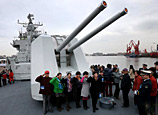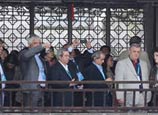
In a notice issued in 2007 by the NDRC, the top economic planner, ruled that scenic areas could change admission fees only once in three years. March marks the start of the second three-year cycle, and many tourist sites have raised their entrance fees.
"Their practice is contradictory to our original intention. Our three-year-no-raise policy has in fact become a three-year-must-raise. There are places that lowered the price or even canceled the entry fee, which may even be beneficial to their overall economic results," Wang said.
The law said the tourist sites should provide tourists with six months' notice before a price hike. Those built on public resources, such as natural scenery and ancient relics, should hold hearings six months before raising prices to solicit opinions from tourists and business owners on whether the charges are necessary and reasonable.
Wang admitted canceling the entry fee for all tourist spots is unrealistic at the moment.
"We will try to work out a solution that can satisfy all parties in the issue, and we are considering allocating more revenue to support tourist areas," he said.
Ticket revenue for China's 153 national 5A-level scenic spots and more than 2,000 4A-level ones generated more than 40 percent of the country's 140 billion yuan in ticket sales in 2012, according to Yang Yanfeng, associate researcher with China Tourism Academy.
Yang Congyu, a college teacher in Beijing, said she welcomed the restriction on raising prices, which she said protects the rights of tourists.
"But I'm concerned there will be a lot of price hikes between now and October, since the law will only be effective in six months," she said.
Yang said she is also concerned about how revenue from the tickets is being used.
"How much is being spent to restore the relics or to protect the natural resources? Local governments running these tourist spots have the responsibility to release this information to the public."

















 Giant pandas safe in quake-hit zone
Giant pandas safe in quake-hit zone


![]()
